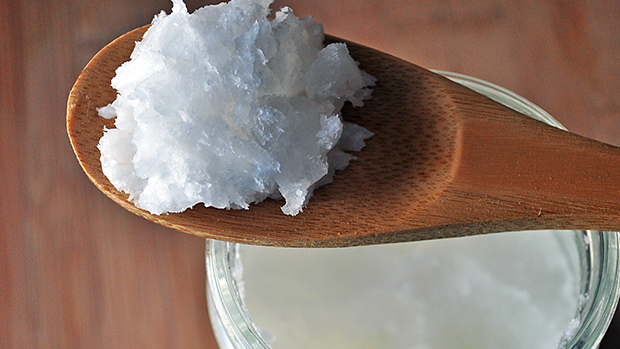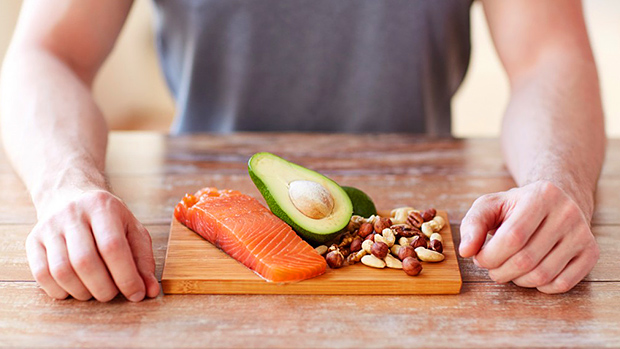"We advise against the use of coconut oil" declared the American Heart Association (AHA) in their latest release about the oil that's been so popular in the health and fitness community.
The AHA said that in 7 out of 7 studies, saturated fats increased LDL cholesterol – the kind of cholesterol you want to keep to a minimum. And since coconut oil is pretty high in saturated fat (82% of it is saturated), the AHA deemed it unhealthy and even unsafe to consume.
Don't panic, there's no reason to stop using it. Not only can coconut oil improve your thyroid health, brain health, and metabolism, it's also great for your heart... despite what the AHA has said. (Remember, these are the same folks who like to slap the "heart healthy" label on Sugar Frosted Sugar kid's cereal.)
As a recent academic review of coconut oil said, it was only when people in societies that rely heavily on the tropical fats stopped eating as much of the stuff, and replaced it with a Westernized diet full of vegetable oils, that heart disease increased.
When coconut-eating populations ate an average of 120 coconuts per year, the rate of heart disease was one of the lowest in the world. Guess all that saturated fat wasn't too hard to handle.

Fats are divided into two categories: saturated and unsaturated. One of the easiest ways to visually differentiate the two is that saturated fats are solid at room temp, unsaturated fats are liquid. The break down gets a little more complex, but for our purposes, let's keep it simple.
Unsaturated Fats
For the chemistry nerds, unsaturated fats have double bonds between molecules, allowing them to liquefy at room temperature. Unsaturated fats are found in things like avocado, olives and olive oil, nuts, and Omega-3s.
Saturated Fats
Saturated fats do NOT have double bonds, which means that the fat becomes "saturated" with hydrogen molecules. Saturated fats are at the heart of the current debate. They're found in things like meat and butter, but they're also found in foods that are responsible for messed up cholesterol and muffin-tops like, well, "Muffin Tops" and other prepackaged snacks, ice cream, and Franken-foods like processed cheese and Hungry Man TV dinners.
Where else are saturated fats found? In palm oil and, you guessed it, coconut oil. And that's about as far as the AHA goes in their demonization of saturated fat. Their argument against it is superficial at best. Because to them, all saturated fat is bad. So let's dig a little deeper.
Coconut oil has MCTs (medium chain triglycerides), which means it's a lean, fast source of fuel. Coconut oil is used in the body in a very different way than, say, fats found in beef or avocado or omega-3s. Coconut oil is over 50% medium chain triglycerides (MCTs). MCTs are – put on your nerd glasses – a type of saturated fat composed of 6-10 carbon links.
The other two types of saturated fats are short-chain triglycerides (SCTs) and long chain triglycerides (LCTs). SCTs are six carbon links and LCTs are 12-18 carbon links. SCTs can be found in foods butter, ghee, dairy, but are also formed in the colon when you eat fiber. LCTs are found in foods like meat and eggs. For now, let's focus mainly on LCTs vs. MCTs since they're the ones you're mostly eating (except for butter, and we all love butter).
What all this basically means is that LCTs are harder for the body to break down. Think of it as the difference between cutting a steak with a steak knife versus a butter knife: the body can break down MCTs faster and with more ease, like the steak knife. This doesn't mean LCTs are "bad," they just require a more complex process to break down.
To be clear, all foods have differing ratios of different types of fat. The categories above are based on where the majority of their fat comes from.
MCTs and Cholesterol
Since MCTs are smaller and easier to break down, they're readily used for fuel by the body. Because they don't stick around like Talkative Timmy at the gym, they won't mess with your heart health. Their fast absorption means that MCTs do NOT partake in the formation of cholesterol. I repeat: they ride the pine when it comes to cholesterol production.
Simple. They made three major mistakes:
- They were commenting on saturated fat. It seems they were looking at the fact that the fat was saturated, instead of looking at MCTs. They stated that, because coconut oil is a saturated fat, and that there is possible evidence it increases LDL cholesterol, it's bad. However, as you now know, MCTs are a completely different kind of saturated fat.
- Cholesterol may not be an accurate measurement. As one progressive doctor, Will Cole, has said: "The studies the AHA cite do not link eating more coconut oil to heart disease; they link it to increasing cholesterol numbers. The reality is, total cholesterol is a poor predictor for assessing heart attack and stroke risk. Studies have found that there might be no association between high total cholesterol and heart attack and stroke risk."
- Coconut oil is not involved in cholesterol production or transportation anyway. Coconut oil is used by the body much differently than other saturated fats, so it isn't involved in cholesterol production.

"Knowledge about coconut oil has been kept buried in medical journals because of a general prejudice against saturated fats" states a review published in the Ghana medical journal. "Coconut oil has been shown to have the potential to protect against not only heart disease but a wide variety of chronic health problems" it goes on to say.
And, instead of citing seven cherry-picked studies like the AHA did (many of which could have flaws, lurking variables, and the like), the authors cited the best kind of evidence of all: millennia worth of actual people consuming high amounts of coconut oil, resulting in exceedingly puny levels of heart disease.
Again, it was only when people stopped eating higher levels of coconut and palm oil, replaced them with a diet high in vegetable oils, that heart disease increased.
How? Coconut oil has been shown to protect your heart, not harm it. Coconut oil is antithrombotic, which means it reduces blood clots, anti-atherosclerotic (helps keep your blood vessels from narrowing, which can cause heart attacks), and hypolipidemic, which means it lowers lipids in your blood. All of these claims are backed by countless studies.
But, most importantly, coconut oil is healthy and has always been healthy as proven by thousands of years worth of real data from real people. And that's the truth.
- Boateng L et. al. Coconut oil and palm oil's role in nutrition, health and national development: A review. Ghana Med J. 2016 Sep;50(3):189–196. PMC.
- Calbom C et. al. How to Help Your Thyroid with Virgin Coconut Oil.
- Fernando W et. al. The role of dietary coconut for the prevention and treatment of Alzheimer's disease: potential mechanisms of action. Br J Nutr. 2015 Jul 14;114(1):1-14. PubMed.
- Dean W et al. Medium Chain Triglycerides: Beneficial Effects on Energy, Atherosclerosis and Aging. Nutrition Review. April 22, 2013/
- Shapiro J. 5 Health Benefits of Short Chain Fatty Acids. Doctors Health Press, April 8, 2016.
- Brown E. What Is a Long-Chain Fatty Acid? San Francisco Gate. December 12, 2018.
- DebMandal M et. al. Coconut (Cocos nucifera L.: Arecaceae): In health promotion and disease prevention. Asian Pac J Trop Med. 2011 Mar;4(3):241-7. PubMed.
- Moody L. The AHA Just Declared Coconut Oil Unhealthy. Here's Why Functional Medicine Doctors Disagree. MindBodyGreen. June 19, 2017.





